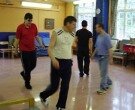
Background
Whilst employment rates for the West Midlands stand at only just under the national average (74.2% in full time employment, Working Brief, Jan 2006), certain local groups find that certain factors act as significant barriers to finding and sustaining meaningful employment. These factors include:
As a result, participation rates for people within these target groups are significantly lower than average. The UK ArtsPEP Development Partnership has identified that existing employment provision in the area is insufficiently flexible to tackle these barriers and take account of the wishes of the individual. The basic premise of this project is that participative arts like drama offer an effective tool for the development of a range of social skills such as communication, creative thinking, self-expression, problem solving teamwork and confidence. Theatre is also a useful communication tool for conveying messages powerfully and effectively helping to raise a voice within the public domain.
Aims
Arts Participation for Employability (ArtsPEP) uses participative arts as a methodology for developing a range of tailor-made training and support opportunities which empower individuals with complex needs to access and remain in employment, and shape future training provision. The mission is to reduce discrimination and exclusion of the most disadvantaged groups by raising awareness amongst stakeholders.
Objectives
To address these inequalities by using engagement with the participatory arts to help members of marginalized groups develop their creative thinking, self-expression, confidence and problem solving and increase their employability.
To use participative arts like drama as a methodology for developing a range of tailor made training and support opportunities to empower individuals with complex needs to assess and remain in employment, and to influence and shape future training provision.
Work with the labour market is also being developed to educate employers about these issues and equip them with the skills they need to effectively work with and sustain the involvement of members of the target groups.
It is envisaged that the fusion of these techniques with more traditional employability methods will empower disadvantaged individuals and facilitate a rewarding passage into today's labour market.
Target Groups
Ex-offenders, people with learning disabilities, workless households, young people at risk of exclusion, drug and alcohol users